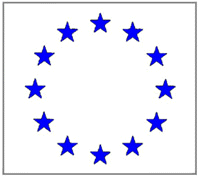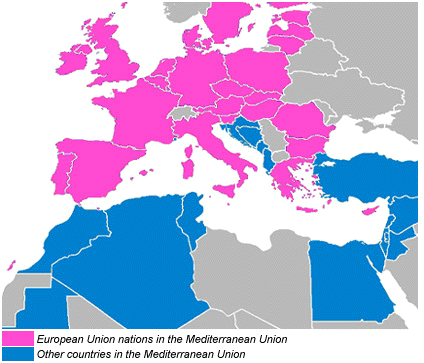...Best of Sicily presents... Best of Sicily Magazine. ... Dedicated to Sicilian art, culture, history, people, places and all things Sicilian. |
by Manlio Lima | ||
Magazine Index Best of Sicily Arts & Culture Fashion Food & Wine History & Society About Us Travel Faqs Contact Map of Sicily
|
The initial proposal was for the Mediterranean Union to be a strictly Mediterranean affair reserved for nations whose territories touch the Mediterranean Sea or its extended basin (the Black Sea, etc.), and the United Kingdom was included based on a few small territories bordering the body of water that the ancient Romans called the sea of the "centre of the world." Germany protested France's political leadership in the undertaking, and so membership was extended to all European Union countries. While Irish, Danish and Polish interests in the Med are not readily apparent, nations such as Romania border the Mediterranean Basin and one of Germany's principal rivers, the Danube, empties into it. Apart from specific "national" interests, particularly the long-sought peace in the Middle East and Turkey's aspiration of entry into the European Union, the event signals a tangible effort to unite nations which have much in common. Their communal interests transcend such matters as better trade policies and improved water-purity and fishing laws, important as these may be. Nobody is discussing a common currency, and the duplication of existing institutions is to be avoided. The latter concern stems The practical role of the Mediterranean Union remains to be defined beyond generalities. The region's challenges are, to say the least, complex. It's no simple feat to rally forty-three countries to the same tune. There are republics, monarchies, near theocracies and the occasional quasi-dictatorship. Rich and poor, a few technically at war with each other and others having longstanding rivalries: Greece and Turkey, Israel and Syria, Algeria and Morocco. And even Britain and Spain have a subtle bone of contention going back three centuries: Gibralter. Farther east, Cyprus remains divided (between Turks and Greeks) since 1974. And what of Sicily? Sicily's position in the new union will be based on Italy's. Malta will have a greater voice, so its independence may afford that island nation a greater potential role. One problem raised by the international dynamic is that boats full of refugees arrive in Sicily each year, from various places but most often departing from ports in Libya (for now only an observer in the new union), while Tunisians arrive by passenger ship and often remain (illegally) in Sicily for years. Immigration issues will have to be addressed --though only if the union assumes this as one of its tasks. There's another Sicilian issue. In conveniently drawing a distinction between "rich" and "poor" Mediterranean nations, a fact frequently overlooked is that most of Italy south of Rome is poorish compared to the far north of the country, with no clear signs that the economy is improving. The economies of Greece, Spain and France are not so strongly divided along regional lines. Nobody has suggested that this newest initiative will be a panacea, but the gathering of so many heads of state in one place (in this case in Paris) is a solid first step. More will be developed at the next meeting, in November. It's easy to be skeptical about the many international organisations, which rarely manage to prevent wars from erupting. The Mediterranean region reflects a great degree of cultural diversity, and the social and political diversity which often accompany it, but also a common heritage. Exchanging ideas and defining common goals is a good beginning. About the Author: Manlio Lima has written for various Italian magazines. | |
Top of Page |
 Welcome
to Club Med. Not since the days of the Roman Empire have all the lands touching the
Mediterranean fallen under the aegis of a single government or organisation.
There's the United Nations, of course, but July (2008) saw the establishment,
on the initiative of French President Nicolas Sarkozy, of the "Euromediterranean
Partnership" linking the European Union (EU) to every Mediterranean
nation except (at least for now) Libya.
Welcome
to Club Med. Not since the days of the Roman Empire have all the lands touching the
Mediterranean fallen under the aegis of a single government or organisation.
There's the United Nations, of course, but July (2008) saw the establishment,
on the initiative of French President Nicolas Sarkozy, of the "Euromediterranean
Partnership" linking the European Union (EU) to every Mediterranean
nation except (at least for now) Libya. in part from the establishment of a similar
initiative, the "Euro-Mediterranean" Barcelona Process,
in 1995, whose progress has been sluggish at best. Clearly, it will take
at least a decade for the new Mediterranean Union, with Sicily close to
its geographical centre, to achieve much of anything. First it must define
itself, and for now it has neither a central office or even a flag (the
one shown here is based on that of the EU). It has been suggested that the
Mediterranean Union might actually supplant the Barcelona Process.
in part from the establishment of a similar
initiative, the "Euro-Mediterranean" Barcelona Process,
in 1995, whose progress has been sluggish at best. Clearly, it will take
at least a decade for the new Mediterranean Union, with Sicily close to
its geographical centre, to achieve much of anything. First it must define
itself, and for now it has neither a central office or even a flag (the
one shown here is based on that of the EU). It has been suggested that the
Mediterranean Union might actually supplant the Barcelona Process.